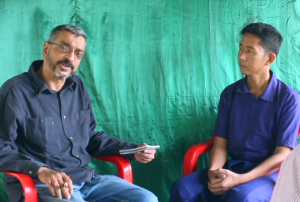The State Administration Council (SAC) established by the Myanmar military after the February 2021 coup approached the Arakan Rohingya Salvation Army (ARSA) to forge a united front to defend Buthidaung against the Arakan Army.
In an interview to The Diplomat at Buthidaung in Myanmar’s Rakhine State on June 24, Major Hlaing Win Tun of the Myanmar military recalled the reasons that prompted the military to join hands with ARSA, which eventually led to the forced conscription and training of hundreds of Rohingya youths from the region, including from refugee camps in Bangladesh.
The full interview is in the video below; a summary follows.
Hlaing Win Tun was attached with light infantry battalion 353 when he was apprehended by the Arakan Army with some other soldiers on May 17. The next day saw the final capture of Buthidaung by the resistance group. The captured soldiers are being detained by the Arakan Army at a location in Buthidaung township.
The major’s admission gives credence to the speculation among a section of the media and observers about the military’s collaboration with ARSA to defend Buthidaung against the advancing Arakan Army.
ARSA was declared a terror group in 2017 by the Myanmar government. The outfit had launched a series of attacks against the military and police in Rakhine State between 2015 and 2017, triggering brutal reprisals. The August 2017 military clearance operation in particular drove over 700,000 Rohingya to flee the country was ostensibly designed to wipe ARSA out from Rakhine State. The group has camps in neighboring Bangladesh and functionaries in the refugee camps at Cox’s Bazar.
Hlaing Win Tun, who had been posted in Buthidaung for the past two years, claimed that his battalion was not responsible for the alliance with ARSA and the atrocities in the township. He implicated a captain and a colonel of the military intelligence battalion, saying they had incited the terror outfit and the new recruits (many of them forcibly conscripted by ARSA) to indulge in the burning and looting of houses belonging mostly to Rakhine Buddhists. Both ARSA and the new Rohingya recruits were stationed in the military establishments near the town, from where they executed the operations.
The major explained that the military’s plan to collaborate with ARSA was conceived last year after the contiguous township of Rathedaung had fallen to the Arakan Army. As many as 750 Rohingya youths were picked up and trained in the military centers near the township.
He added that as the burning began, ARSA and the trained Rohingya youths had summoned their relatives from the neighboring villages to loot the houses in the town. The houses were burnt after they were burgled.
The major also spelled out the reasons contributing to the Arakan Army’s continuous success against the Myanmar military. He pointed out that the Arakan Army has a deep commitment to liberate Rakhine State from the military. After the coup in 2021, the strength of the military has been reduced. In addition, the military has been facing severe challenges at the lower level, which are being ignored by the top brass. As a result, he said, the military suffers from both “low morale” and “lack of support” from the people.
He predicted the Arakan Army’s success in liberating the entire Rakhine State from the military “very soon.” The SAC, he felt, would also be defeated in other regions of Myanmar if all the resistance groups are able to unite, indicating that the ethnic armed organizations (EAO) and the newly formed People’s Defense Force (PDF) must join hands for a united front in the ongoing war.
Hlaing Win Tun, who hails from Yangon, also expressed hope of being released from captivity. He claimed that he would “cooperate” with the Arakan Army after the war drew to a close in Rakhine State.

































